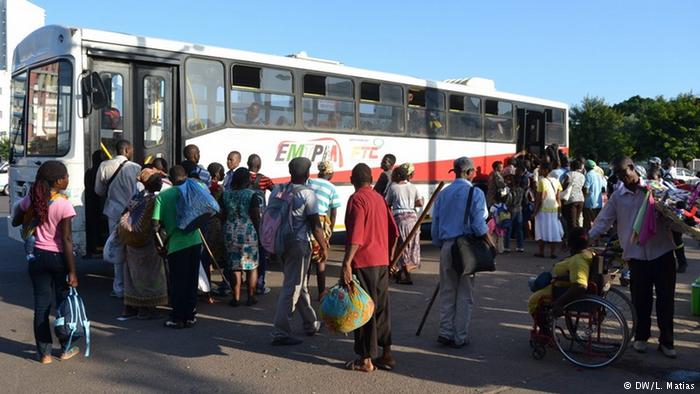Mozambique: Chongoene asks Chapo for rehabilitation of irrigation systems, paved roads
Mozambican government to exchange transport subsidy for bus concessions

DW
The measure is part of the strategy to combat the inefficiency of the country’s transport system, which Mozambicans say is far from meeting their needs.
Long queues and ‘My Love’ open transport trucks are features of the daily life of Maputo and Matola residents, prey to the inefficiency of the transport system in the country’s capital. The problem affects thousands of people who, in addition to failing to meet their professional obligations, have to pay double or triple the amount on transport that they paid in previous years.
“It would be a lie to talk about comfort in a ‘chapa’. That is no longer the case in Maputo,” Maputo resident Renato Nhambole complains.
Passenger Feliz Armando similarly speaks of a “chaotic situation”. Passengers spend “a lot of time at bus stops”, waiting perhaps “four or five hours” for a chapa. According to Feliz, it’s only the ‘My Loves’ that make live possible.

Buses instead of cash
To address the problem, the Mozambican government has signed a memorandum of understanding with the Mozambican Road Transport Federation (FEMATRO) for the provision of 300 new buses this year.
“It is a combination of measures”, Minister of Transport and Communications Carlos Mesquita explains. “It is necessary to renew the fleet, and to look at maintenance and the management of the service itself”. That is, to perform “a restructuring of the whole process”.
The donation of 300 buses to the Federation is a new modality of public transport subsidy and will replace the government’s monthly payment to FEMATRO.
After receiving the vehicles, which will be delivered “with an elastic spacing”, according to the Minister of Transport, carriers will have to return to the government the corresponding amount of money within a time frame agreed between the two parties.
“The important thing is to have an agreement for the return of the contribution made by the state,” Minister Mesquita said.
The Federation is satisfied
FEMATRO president Castigo Nhamane says the initiative will address poor public transport provision in the country’s main urban centres, especially Maputo and Matola, where the situation is critical.
“Exchanging the monetary subsidy for the acquisition of means of transport was a FEMATRO proposal,” Nhamane says. “We noted that the money=paid to the operators was not producing visible results either for the operators or passengers, much less to the government, whose money it is.”
Programmed maintenance of buses and the creation of bus lanes will also improve the transport system in Maputo.











Leave a Reply
Be the First to Comment!
You must be logged in to post a comment.
You must be logged in to post a comment.